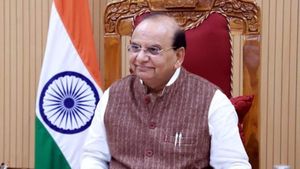The Ninth Forum on Public Finances of Arab Countries convened recently in Dubai, marking a significant step toward enhancing financial and economic integration among Arab nations. Hosted just before the 2025 World Government Summit, this forum provided key insights about sustainable finance policies necessary for adapting to contemporary global challenges.
Sheikh Maktoum bin Mohammed bin Rashid Al Maktoum, Vice President and Minister of Finance of the UAE, underscored the forum's role as "a strategic platform for enhancing financial and economic integration among Arab countries." He emphasized the necessity of developing flexible financial policies to address shifting global economic landscapes and to support sustainable growth.
During the event, Mohamed bin Hadi Al Hussaini, the UAE's Minister of State for Financial Affairs, highlighted the importance of adopting sound financial strategies to bolster sustainable economic development across the Arab region. He noted the current phase requires intensified efforts to align with global economic transformations, stressing, "This forum contributes to crafting future financial visions supporting developmental strategies."
Attendees included finance ministers, central bank governors from various Arab nations, and representatives from international financial organizations. A prominent figure at the forum, Kristalina Georgieva, Managing Director of the IMF, remarked on the solid partnerships established with Arab nations, asserting, "The IMF has established solid partnerships with Arab nations which have become increasingly significant today, amid the substantial transformations occurring worldwide."
The discussions centered around several pressing issues. One topic of focus was public finance policies crafted to confront the mounting debt pressures many countries are currently facing. It was noted during the forum how several regional economies are struggling with tensions arising from conflicts and climate disasters, which severely impact their growth prospects.
Dr. Fahd bin Mohammed Al-Turki, Director General of the Arab Monetary Fund, expressed the forum's importance by stating, "This platform is pivotal for strengthening the fiscal policies of Arab countries. The discussions contribute to the development of innovative financial strategies capable of addressing future challenges."
The forum also included panels on the necessity of enhancing policies to adapt to the changing climate as well as strategies to redesign tax systems to align with major economic shifts. The urgency of these discussions cannot be overstated, as countries grapple with the economic costs of climate change.
Finally, this year’s World Government Summit, which will follow the forum, is anticipated to welcome over 30 heads of state and government, 140 government delegations, and more than 80 international organizations. The summit aims to build on the discussions initiated at the forum, providing a broader venue for exploring innovative ways to achieve economic stability and resilience within the Arab world.
Overall, the Ninth Forum on Public Finances stands as a noteworthy initiative within the Arab region, providing necessary dialogues and collaborative strategies aimed at driving forward sustainable development. The outcomes of this forum will undeniably set the stage for future discussions on economic policies and strategies at the World Government Summit.



